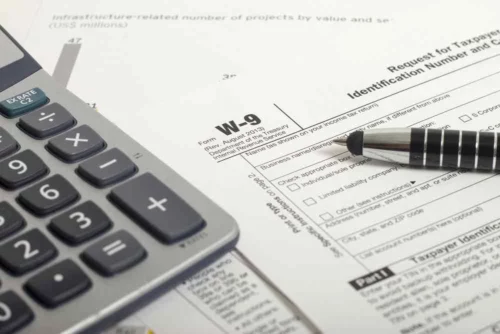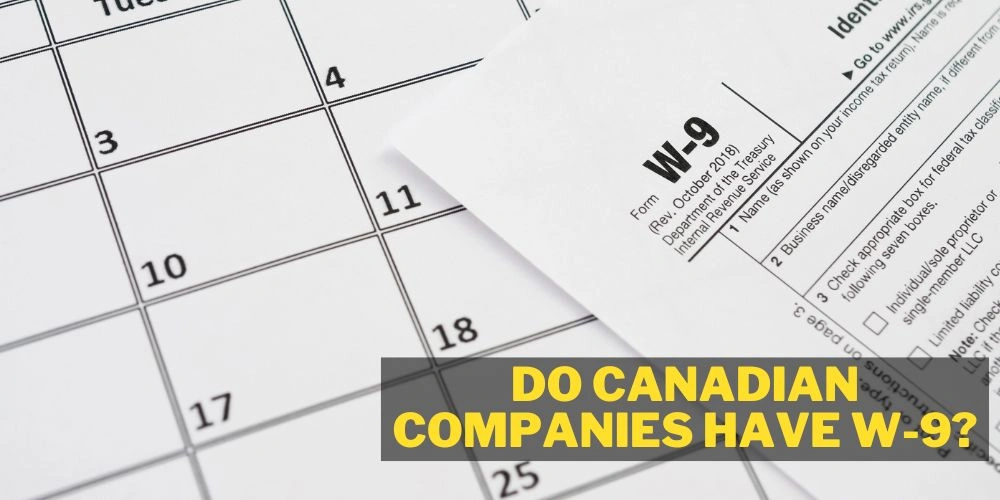In the realm of cross-border business operations, understanding tax obligations and requisite paperwork is crucial for compliance and smooth transactions.
For Canadian companies navigating the complexities of the U.S. tax system, questions often arise concerning the requirement of certain forms, such as the W-9. So, do Canadian companies have W9?
This article aims to elucidate whether Canadian companies need a W-9, delving into the intricacies of taxation and providing guidance on how to manage these situations accurately.
Understanding W-9 Forms
The W-9 form, Request for Taxpayer Identification Number and Certification, is a critical document within the U.S. tax system.
Its primary purpose is for individuals and entities to provide their taxpayer identification number to entities they are engaging with financially.

This aids in accurate reporting to the Internal Revenue Service (IRS), especially regarding income paid and tax withholdings.
The form is a staple in domestic transactions within the United States, setting a foundational parameter for tax compliance.
The Canadian Context
Canadian and U.S. tax systems exhibit distinct traits governed by their individual laws and regulations. Notably, the W-9 form is an instrument of the U.S. tax system and has no direct counterpart in Canada.
Do Canadian Companies Have W9?
When Canadian companies engage with U.S. businesses, they are more likely to encounter forms designed for non-U.S. entities.
The W-8BEN and W-8BEN-E forms serve this exact purpose. They are utilized by individuals and entities to assert their non-U.S. status, thereby establishing their exemption from certain U.S. tax withholdings.
Additionally, the NR4 form sheds light on the Canadian income paid to non-residents, aligning with Canada’s taxation principles.
Canadian businesses also navigate through identifications such as the Business Number or GST/HST number, which serve as tax identifiers within Canada.
These identifications are pivotal for businesses in managing and fulfilling their tax responsibilities domestically.
When Canadian Companies May Encounter W-9 Forms
Instances may arise where a Canadian company is asked to fill out a W-9 form, such as when engaging in business with a U.S. company, earning rental income from U.S. property, or as independent contractors for U.S. entities.
This intersection breeds confusion due to the misapplication of domestic tax forms for international transactions.
Dealing with W-9 Requests
When faced with a W-9 request, Canadian companies should clarify their non-U.S. status, pointing towards the appropriate W-8 form instead.
It denotes the necessity for effective communication to resolve misunderstandings regarding tax obligations and form submissions.
Engaging in dialogue fortified with legal and tax advice ensures compliance and mitigates the risk of inaccuracies.
Tax Obligations for Canadian Companies in the U.S.
Engaging in business within the U.S. subjects Canadian companies to the U.S. tax system, underpinned by filing taxes for income sourced from U.S. operations.
The treaty between the U.S. and Canada plays a pivotal role in defining tax obligations and avoiding double taxation, safeguarding the interests of businesses operating across borders.

Compliance for Canadian Companies
Compliance with U.S. tax laws is paramount for Canadian businesses to prevent penalties and enhance their operational legality.
This involves submitting accurate forms, such as the W-8 series for entities and the 1040-NR for nonresident alien individuals or foreign entities.
Adherence to these guidelines fortifies a company’s standing, fostering a compliant and robust business environment.
Pro Tips
Navigating cross-border taxation demands a keen eye on specific strategies to ensure compliance and strategic operation.
Consulting with a cross-border tax expert provides tailored advice, aimed at navigating the complexities unique to each business.
Additionally, maintaining diligent records of all cross-border transactions aids in preparedness for IRS audits or inquiries, reinforcing the company’s tax position.
Frequently Asked Questions
Do Canadian companies need to have a U.S. Taxpayer Identification Number (TIN)?
While not all Canadian companies will require a U.S. TIN, certain transactions or income sources in the U.S. may necessitate obtaining one. This is often tied to tax filing requirements within the U.S. and is assessed on a case-by-case basis.
How can a Canadian company obtain a W8-BEN or W8-BEN-E form?
These forms can be directly downloaded from the IRS website. Completing them involves providing company details, including the nature of the U.S. income and claiming benefits under the U.S.-Canada tax treaty, if applicable.
Are Canadian freelancers required to fill out a W-9 form for U.S. clients?
Canadian freelancers should not fill out a W-9 form for U.S. clients. Instead, they should use the W-8BEN form to declare their non-U.S. status and provide their taxpayer information.
What should a Canadian company do if they are wrongfully asked for a W-9 by a U.S. partner?
The company should inform the U.S. partner of their non-U.S. status and clarify the requirement to use a W-8 form instead of a W-9. Providing education and resources about the correct forms can aid in mitigating confusion.
How does the tax treaty between Canada and the U.S. impact Canadian companies operating in America?
The tax treaty helps to prevent double taxation of income earned across borders, provides reduced tax rates on certain incomes, and defines tax obligations for entities operating in both countries. Understanding these provisions is essential for Canadian companies to optimize their tax strategy in the U.S.
Conclusion
For Canadian companies, understanding the requirement and applicability of the W-9 form is integral to maintaining compliance with U.S. tax laws.
While the direct use of the W-9 form is not applicable, substituting it with forms such as the W-8BEN or W-8BEN-E, alongside clear communication and consultation with tax experts, ensures adherence to tax obligations and smooth operation across borders.
With proper guidance and a clear understanding of the applicable forms and regulations, Canadian companies can navigate the U.S. tax landscape effectively.
By staying informed and proactive in managing tax obligations, Canadian companies can ensure seamless operations and maintain compliance when engaging in business activities in the United States.


 Tags:
Tags:










